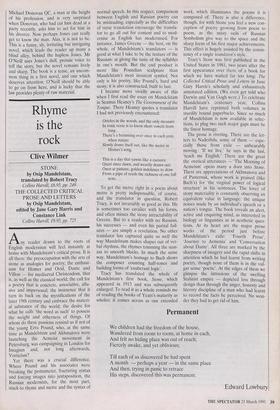Rhyme is the rock
Clive Wilmer
STONE by Osip Mandelstam, translated by Robert Tracy Collins Harvill, £6.95, pp. 249 THE COLLECTED CRITICAL PROSE AND LETTERS by Osip Mandelstam, edited by Jane Gary Harris and Constance Link Collins Hamill, £9.95, pp. 725 Any reader drawn to the roots of English modernism will feel instantly at home with Mandelstam's critical prose. It is all there: the preoccupation with the arts of stone as analogies for poetry; the enthusi- asm for Homer and Ovid, Dante and Villon — for mediaeval Christendom, that is, as well as the classical world; the call for a poetry that is concrete, associative, allu- sive and impersonal; the insistence that it turn its back on the mystifications of the later 19th century and embrace the materi- al substance of the world; the desire for what he calls 'the word as such' to possess the weight and otherness of things. Of whom do these passions remind us if not of the young Ezra Pound, who, at the same time as Mandelstam and Akhmatova were launching the Acmeist movement in Petersburg, was campaigning in London for Imagism and, not long afterwards, Vorticism?
Yet there was a crucial difference. Where Pound and his associates were breaking the pentameter, fracturing syntax and forcing images into juxtaposition, the Russian modernists, for the most part, stuck to rhyme and metre and the syntax of
normal speech. In this respect, comparison between English and Russian poetry can be misleading, especially as the difficulties of verse translation encourage the transla- tor to go all out for content and to mod- ernise as English has modernised. For instance, James Greene — the best, on the whole, of Mandelstam's translators — is good at what I take to be the texture of the Russian: at giving the taste of the syllables in one's mouth. But the end product is more like Poundian sculpture than Mandelstam's most insistent symbol. Not only is his poetry, like Pound's, hard and stony; it is also constructed, built to last.
I became more vividly aware of this when I first read the essay on Mandelstam in Seamus Heaney's The Government of the Tongue- There Heaney quotes a translator I had not previously encountered:
Orioles in the woods, and the only measure In tonic verse is to know short vowels from long.
There's a brimming over once in each year, when nature Slowly draws itself out, like the meter in Homer's song, This is a day that yawns like a caesura: Quiet since dawn, and wearily drawn out; Oxen at pasture, golden indolence to draw From a pipe of reeds the richness of one full note.
To get the metre right in a poem about metre is pretty indispensable, of course, and the translator in question, Robert Tracy, is not invariably as good as this. He is sometimes too cavalier with his forms, and often misses the stony intractability of Greene. But to a reader with no Russian, his successes — and even his partial fail- ures — are simply a revelation. No other translator has captured quite so well the way Mandelstam makes shapes out of ver- bal rhythms, the rhymes trimming the stan- zas to smooth blocks. In much the same way, Mandelstam's homage to Bach shows the composer counting half-tones and building forms of 'exuberant logic'.
Tracy has translated the whole of Mandelstam's first book, Stone, which appeared in 1913 and was subsequently enlarged. To read it as a whole reminds me of reading the books of Yeats's maturity as wholes; it comes across as one extended work, which illuminates the poems it is composed of. There is also a difference, though, for with Stone you feel a new con- ception of poetry growing from poem to poem, as the misty veils of Russian Symbolism give way to the space and the sharp focus of his first major achievements. This effect is hugely assisted by the consis- tency of a single translator's style.
Tracy's Stone was first published in the United States in 1981, two years after the first appearance over there of a book for which we have waited far too long: The Collected Critical Prose and Letters in Jane Gary I larris's scholarly and exhaustively annotated edition. (We even get told who Darwin and Van Gogh were.) To celebrate Mandelstam's centenary year, Collins Harvill have reprinted both volumes in sturdily bound paperbacks. Since so much of Mandelstam is now available in selec- tions, to plug two such major gaps must be the finest homage.
The prose is riveting. There are the let- ters to Nadezhda, some of them — espe- cially those from exile — unbearably moving : 'If we live,' he says in the last, 'teach me English.' There are the great the oretical utterances — 'The Morning of Acmeism' opens many a door into Stone. There are appreciations of Akhmatova and of Pasternak, whose work is praised (like Bach's) for 'the virginal power of logical structure' in his sentences. The lover of stony materiality is constantly observing an equivalent value in language: the unique noises made by an individual's speech or a nation's tongue. The book reveals an alert, active and enquiring mind, as interested in biology or linguistics as in aesthetic ques- tions. At its heart are the major prose works of the period just before Mandelstam's exile: 'Fourth Prose', 'Journey to Armenia' and 'Conversation about Dante'. All three are marked by the sharpness of imagery and the rapid shifts in attention which he had learnt from writing poetry, though none of them is in the vul- gar sense 'poetic'. At the edges of them we glimpse the intrusions of the swelling Stalinist empire — depicted less through design than through the anger, honesty and literary discipline of a man who had learnt to record the facts he perceived. No won- der they had to get rid of him.


























































 Previous page
Previous page